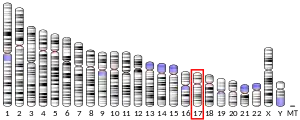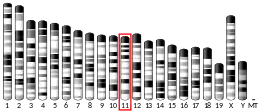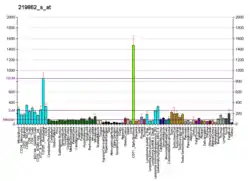Nuclear prelamin A recognition factor
Nuclear prelamin A recognition factor, also known as NARF, is a protein which in humans is encoded by the NARF gene.[5][6][7]
| NARF | |||||||||||||||||||||||||||||||||||||||||||||||||||
|---|---|---|---|---|---|---|---|---|---|---|---|---|---|---|---|---|---|---|---|---|---|---|---|---|---|---|---|---|---|---|---|---|---|---|---|---|---|---|---|---|---|---|---|---|---|---|---|---|---|---|---|
| Identifiers | |||||||||||||||||||||||||||||||||||||||||||||||||||
| Aliases | NARF, IOP2, nuclear prelamin A recognition factor | ||||||||||||||||||||||||||||||||||||||||||||||||||
| External IDs | OMIM: 605349 MGI: 1914858 HomoloGene: 57048 GeneCards: NARF | ||||||||||||||||||||||||||||||||||||||||||||||||||
| |||||||||||||||||||||||||||||||||||||||||||||||||||
| |||||||||||||||||||||||||||||||||||||||||||||||||||
| |||||||||||||||||||||||||||||||||||||||||||||||||||
| |||||||||||||||||||||||||||||||||||||||||||||||||||
| Wikidata | |||||||||||||||||||||||||||||||||||||||||||||||||||
| |||||||||||||||||||||||||||||||||||||||||||||||||||
Function
Several proteins have been found to be prenylated and methylated at their carboxyl-terminal ends. Prenylation was initially believed to be important only for membrane attachment. However, another role for prenylation appears to be its importance in protein–protein interactions. The only nuclear proteins known to be prenylated in mammalian cells are prelamin A- and B-type lamins. Prelamin A is farnesylated and carboxymethylated on the cysteine residue of a carboxyl-terminal CaaX motif. This post-translationally modified cysteine residue is removed from prelamin A when it is endoproteolytically processed into mature lamin A. The protein encoded by this gene binds to the prenylated prelamin A carboxyl-terminal tail domain. It may be a component of a prelamin A endoprotease complex. The encoded protein is located in the nucleus, where it partially colocalizes with the nuclear lamina. It shares limited sequence similarity with iron-only bacterial hydrogenases. Alternatively spliced transcript variants encoding different isoforms have been identified for this gene, including one with a novel exon that is generated by RNA editing.[5]
References
- GRCh38: Ensembl release 89: ENSG00000141562 - Ensembl, May 2017
- GRCm38: Ensembl release 89: ENSMUSG00000000056 - Ensembl, May 2017
- "Human PubMed Reference:". National Center for Biotechnology Information, U.S. National Library of Medicine.
- "Mouse PubMed Reference:". National Center for Biotechnology Information, U.S. National Library of Medicine.
- "Entrez Gene: NARF nuclear prelamin A recognition factor".
- Barton RM, Worman HJ (Oct 1999). "Prenylated prelamin A interacts with Narf, a novel nuclear protein". The Journal of Biological Chemistry. 274 (42): 30008–18. doi:10.1074/jbc.274.42.30008. PMID 10514485.
- Hackstein JH (Feb 2005). "Eukaryotic Fe-hydrogenases -- old eukaryotic heritage or adaptive acquisitions?". Biochemical Society Transactions. 33 (Pt 1): 47–50. doi:10.1042/BST0330047. PMID 15667261.
Further reading
- Maltese WA (Dec 1990). "Posttranslational modification of proteins by isoprenoids in mammalian cells". FASEB Journal. 4 (15): 3319–28. doi:10.1096/fasebj.4.15.2123808. PMID 2123808. S2CID 17511637.
- Barton RM, Worman HJ (Oct 1999). "Prenylated prelamin A interacts with Narf, a novel nuclear protein". The Journal of Biological Chemistry. 274 (42): 30008–18. doi:10.1074/jbc.274.42.30008. PMID 10514485.
- Hackstein JH (Feb 2005). "Eukaryotic Fe-hydrogenases -- old eukaryotic heritage or adaptive acquisitions?". Biochemical Society Transactions. 33 (Pt 1): 47–50. doi:10.1042/BST0330047. PMID 15667261.
- Rual JF, Venkatesan K, Hao T, Hirozane-Kishikawa T, Dricot A, Li N, Berriz GF, Gibbons FD, Dreze M, Ayivi-Guedehoussou N, Klitgord N, Simon C, Boxem M, Milstein S, Rosenberg J, Goldberg DS, Zhang LV, Wong SL, Franklin G, Li S, Albala JS, Lim J, Fraughton C, Llamosas E, Cevik S, Bex C, Lamesch P, Sikorski RS, Vandenhaute J, Zoghbi HY, Smolyar A, Bosak S, Sequerra R, Doucette-Stamm L, Cusick ME, Hill DE, Roth FP, Vidal M (Oct 2005). "Towards a proteome-scale map of the human protein–protein interaction network". Nature. 437 (7062): 1173–8. Bibcode:2005Natur.437.1173R. doi:10.1038/nature04209. PMID 16189514. S2CID 4427026.
- Kimura K, Wakamatsu A, Suzuki Y, Ota T, Nishikawa T, Yamashita R, Yamamoto J, Sekine M, Tsuritani K, Wakaguri H, Ishii S, Sugiyama T, Saito K, Isono Y, Irie R, Kushida N, Yoneyama T, Otsuka R, Kanda K, Yokoi T, Kondo H, Wagatsuma M, Murakawa K, Ishida S, Ishibashi T, Takahashi-Fujii A, Tanase T, Nagai K, Kikuchi H, Nakai K, Isogai T, Sugano S (Jan 2006). "Diversification of transcriptional modulation: large-scale identification and characterization of putative alternative promoters of human genes". Genome Research. 16 (1): 55–65. doi:10.1101/gr.4039406. PMC 1356129. PMID 16344560.
- Yamada M, Ohnishi J, Ohkawara B, Iemura S, Satoh K, Hyodo-Miura J, Kawachi K, Natsume T, Shibuya H (Jul 2006). "NARF, an nemo-like kinase (NLK)-associated ring finger protein regulates the ubiquitylation and degradation of T cell factor/lymphoid enhancer factor (TCF/LEF)". The Journal of Biological Chemistry. 281 (30): 20749–60. doi:10.1074/jbc.M602089200. PMID 16714285.
- Lev-Maor G, Sorek R, Levanon EY, Paz N, Eisenberg E, Ast G (2007). "RNA-editing-mediated exon evolution". Genome Biology. 8 (2): R29. doi:10.1186/gb-2007-8-2-r29. PMC 1852406. PMID 17326827.




